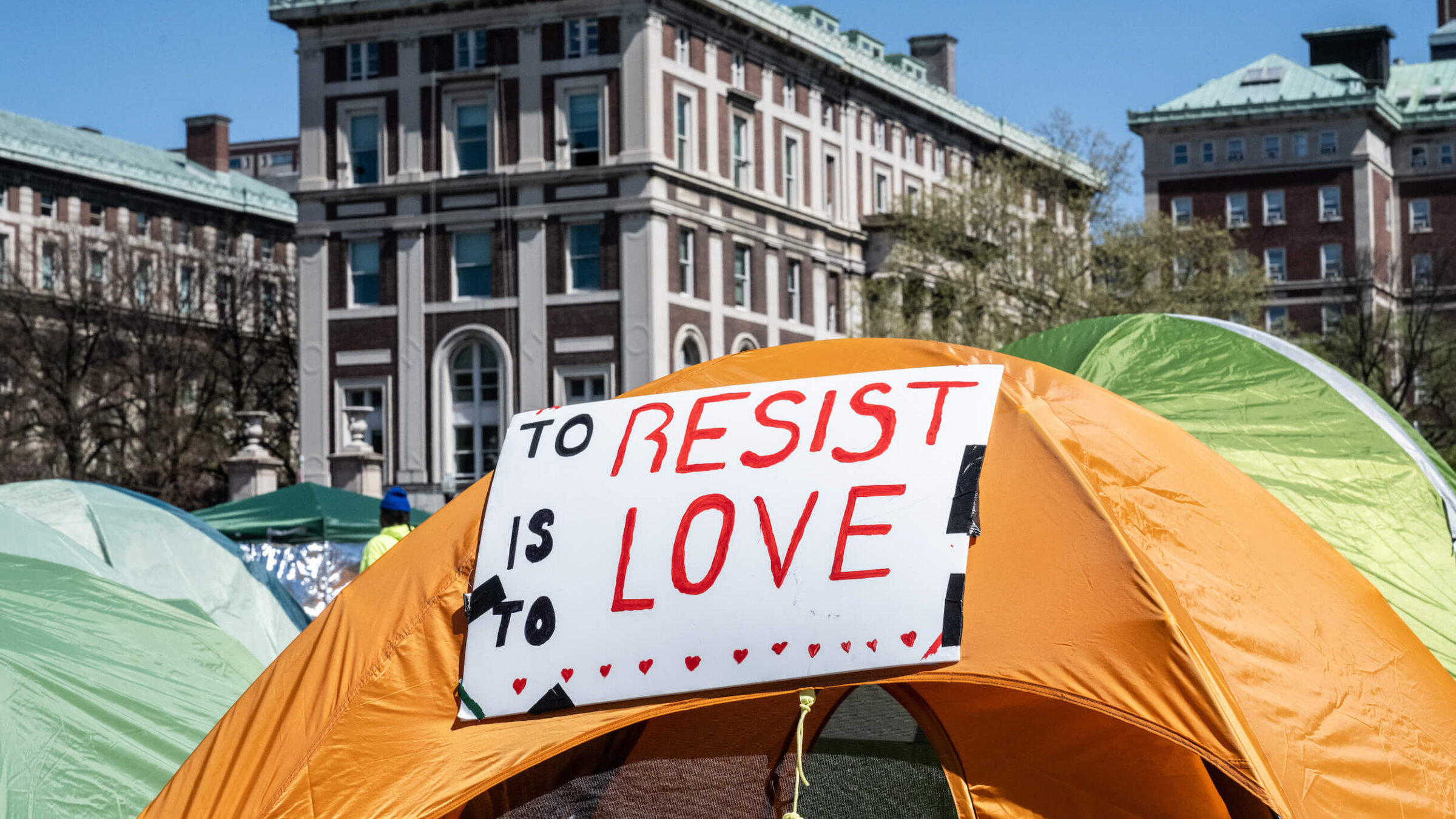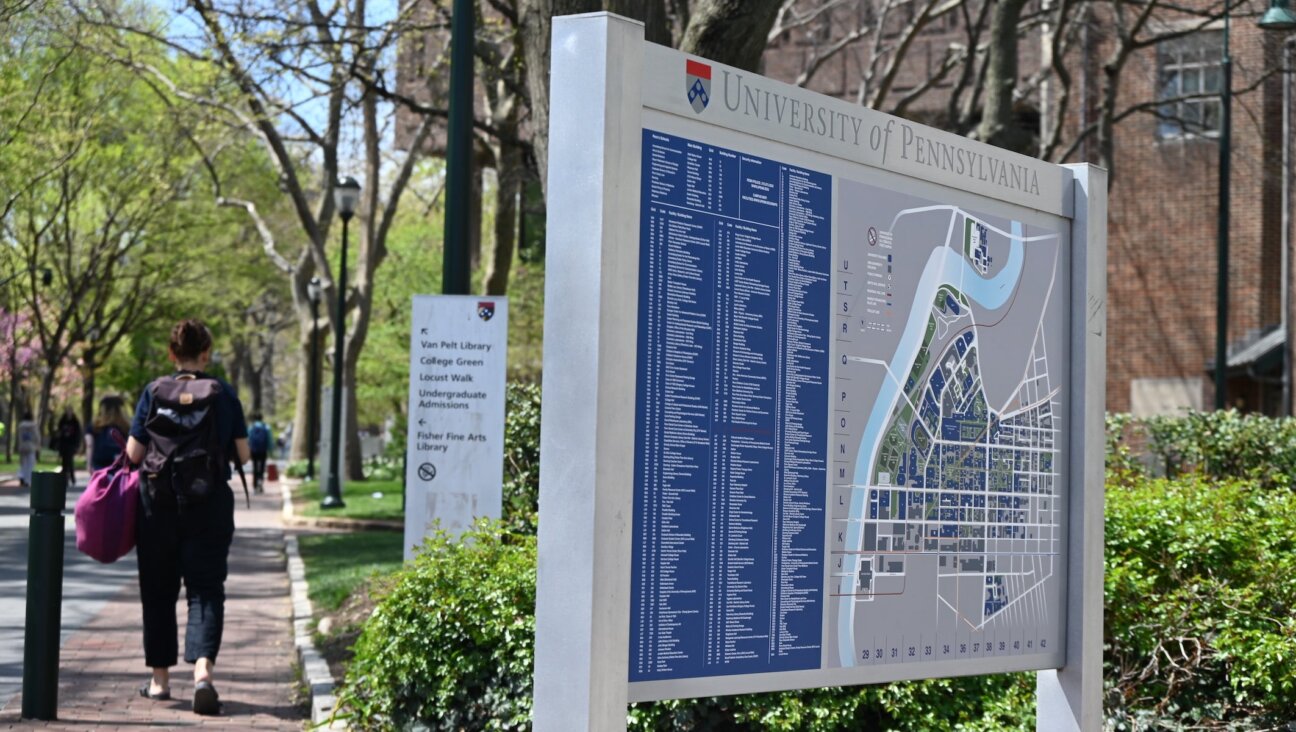Not just Columbia: The center of campus resistance is in Israel
Nadera Shalhoub-Kevorkian, a Palestinian-Israeli professor at Hebrew University, is on her way to becoming the face of university protesters worldwide

Pro-Palestinian demonstrators at an encampment at Columbia University. Photo by Stephanie Keith/Bloomberg/Getty Images
Nadera Shalhoub-Kevorkian is becoming the face of academic political resistance in Israel. And as American campuses, most notably Columbia University and the University of Southern California, are being rocked by crackdowns on political speech, she may well become the face for campus protesters across the globe.
Shalhoub-Kevorkian, a Palestinian-Israeli professor of criminology and law at Hebrew University and a U.S. citizen, was arrested at her home in East Jerusalem by Israeli police last week on suspicion of incitement to terrorism and violence. Her home was searched, and a laptop and cellphone confiscated, along with some papers on which she was working and a collection of books by the noted Palestinian poet Mahmood Darwish.
This the long shadow of apartheid state tactics. Shalhoub-Kevorkian’s harassment was punishment for her principled and sustained criticism of Israeli state practices of racial violence. While incarcerated overnight, she had her arms and ankles shackled, and was held in urine-drenched and cockroach-infested facilities and denied her essential medications. A judge who ordered her release found no adequate reason for her arrest, noting that, if some statements occasionally “crossed the line,” she was not a threat, nor had she incited violence.
The reason for her treatment is clear: She has long stood against Israel’s curtailment of any possibility of a Palestinian future, and dares to publicly charge Israel with genocide. She spoke out against the war, as she has long spoken out, knowing full well the awful weight of the state that will be brought to bear down on her. Itamar Ben-Gvir, Israel’s far-right minister of national security, said her detention “conveys an important message — whoever incites against the State of Israel, we will take action against them.”
Hers is a profile in barricading against erasure of war crimes from the academy of higher learning. She exemplifies a pedagogy of the oppressed.
That pedagogy is now on view in the U.S., especially at Columbia.
Taking a cue from 1980s anti-apartheid campus activism — and the famous 1968 Columbia protests against the Vietnam War — student protesters last week pitched camp on the central Columbia lawn fronting the famous Butler Library, on the same day Columbia President Minouche Shafik appeared before a Congressional committee.
The university declared the students to be trespassing and ordered them to leave. When they refused, arrests of more than 110 students started on grounds they constituted “a clear and present danger.” The NYPD was asked to assist campus police in the action.
As word circulated, nearly a thousand students left class and circled the encampment in their support. The NYPD Chief characterized arrested students as “peaceful,” saying they “offered no resistance whatsoever.” Now, Columbia has notified student campers of their suspension, and is threatening some with canceling their graduation this spring.
Columbia’s administration appears to have learned nothing from the protests of the university’s past, in which harsh consequences for participating students only fueled the protest movement. Their actions have brought more attention to the students’ cause. Protesting encampments have started to pop up on other campuses around the country, in solidarity.
So, who did they learn from?
Perhaps the administrators of Hebrew University — Shalhoub-Kevorkian’s employer.
A month before her arrest, Hebrew University officially suspended Shalhoub-Kevorkian, and the university’s president, Asher Cohen, asked her to resign. Her views had by then been mischaracterized in much of the mainstream Israeli media, most notably her point that the actions of Hamas, including rape, were not done “in her name” — a statement widely misreported as suggesting that there were no atrocities committed on Oct. 7. Hebrew University’s leaders seemed especially incensed that she had signed a letter, penned by international researchers on childhood, characterizing Israel’s onslaught in Gaza as genocide and calling for an immediate ceasefire.
In announcing Shalhoub-Kevorkian’s suspension, Cohen declared the institution “a Zionist university.” Following global criticism by scholars objecting to both the suspension and the university’s shameless embrace of a political ideology — and at least one prominent faculty resignation — Hebrew University reinstated Shalhoub-Kevorkian fully, if begrudgingly. It also retracted its self-characterization as “Zionist.” (While Hebrew University issued a statement against Shalhoub-Kevorkian’s arrest, it has also failed to remove a social media post announcing her suspension from its website.)
Principled protests have effects. Columbia’s administrators are now learning that lesson.
Monday afternoon, hundreds of Columbia faculty walked out to protest the university’s choice to call in the police to arrest the student protesters. Too many university administrations have rushed to limit faculty and student activism and teaching critical of Israel as too sensitive to touch.
USC canceled a planned commencement address by its Muslim, pro-Palestinian valedictorian, Asna Tabassum, because her critics had uncovered an old social media post calling for Israel’s ending. The director of USC’s “genocide and resistance studies” program, noted Holocaust historian Wolf Gruner, wrote a strong letter supporting Tabassum, a stellar bioengineering and Holocaust studies student, lauding her for her commitment to justice for all.
But USC President Carol Folt has only continued to dig in, canceling all commencement addresses. The point, it seems, is to punish all graduating students in the name of donors, unconditional supporters of Israel, and politicians bent on controlling criticism and transforming a perceived culture of campus liberalism.
As a society, we have accepted that the global rise in authoritarian regimes represses free thought and speech. Now, we must confront the surprising extent to which societies that self-characterize as liberal democracies committed to free speech have also made it clear they are ready to restrict critical expression. The Israeli state is helping to make otherwise self-declaratively liberal societies and their institutions more comfortable with being less liberal and less democratic.
Yes, it is true that ugly antisemitic incidents have proliferated around campus protests, including at Columbia, where Jewish students reported hearing chants including “go back to Poland.” But the vast majority of protesters are not expressing hate. Instead, they are upholding Shalhoub-Kervorkian’s baseline principles: That Palestinians should be treated with dignity, equality, and respect, and that giving them such treatment would lead to a decline in violence. She would have us think and act toward the world we want to inhabit.
And she would have us know, in Israel as on Columbia’s campus, that repression is the weapon of unjust power. Thankfully some American students appear to be hearing the call.















